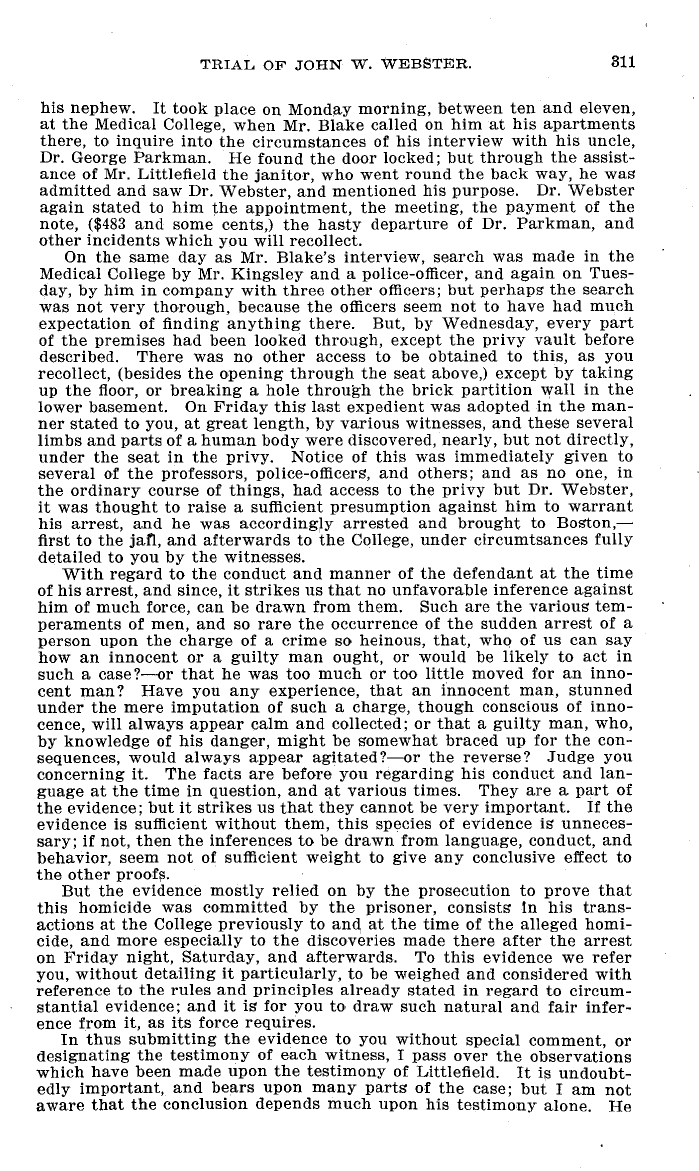|
TRIAL OF JOHN W. WEBSTER. 311
his nephew. It took place on Monday morning, between ten and eleven,
at the Medical College, when Mr. Blake called on him at his apartments
there, to inquire into the circumstances of his interview with his uncle,
Dr. George Parkman. He found the door locked; but through the assist-
ance of Mr. Littlefield the janitor, who went round the back way, he was
admitted and saw Dr. Webster, and mentioned his purpose. Dr. Webster
again stated to him the appointment, the meeting, the payment of the
note, ($483 and some cents,) the hasty departure of Dr. Parkman, and
other incidents which you will recollect.
On the same day as Mr. Blake's interview, search was made in the
Medical College by Mr. Kingsley and a police-officer, and again on Tues-
day, by him in company with three other officers; but perhaps the search
was not very thorough, because the officers seem not to have had much
expectation of finding anything there. But, by Wednesday, every part
of the premises had been looked through, except the privy vault before
described. There was no other access to be obtained to this, as you
recollect, (besides the opening through the seat above,) except by taking
up the floor, or breaking a hole through the brick partition wall in the
lower basement. On Friday this last expedient was adopted in the man-
ner stated to you, at great length, by various witnesses, and these several
limbs and parts of a human body were discovered, nearly, but not directly,
under the seat in the privy. Notice of this was immediately given to
several of the professors, police-officers, and others; and as no one, in
the ordinary course of things, had access to the privy but Dr. Webster,
it was thought to raise a sufficient presumption against him to warrant
his arrest, and he was accordingly arrested and brought to Boston,-
first to the jail, and afterwards to the College, under circumtsances fully
detailed to you by the witnesses.
With regard to the conduct and manner of the defendant at the time
of his arrest, and since, it strikes us that no unfavorable inference
against
him of much force, can be drawn from them. Such are the various tem-
peraments of men, and so rare the occurrence of the sudden arrest of a
person upon the charge of a crime so heinous, that, who of us can say
how an innocent or a guilty man ought, or would be likely to act in
such a case?-or that he was too much or too little moved for an inno-
cent man? Have you any experience, that an innocent man, stunned
under the mere imputation of such a charge, though conscious of inno-
cence, will always appear calm and collected; or that a guilty man, who,
by knowledge of his danger, might be somewhat braced up for the con-
sequences, would always appear agitated?-or the reverse? Judge you
concerning it. The facts are before you regarding his conduct and lan-
guage at the time in question, and at various times. They are a part of
the evidence; but it strikes us that they cannot be very important. If the
evidence is sufficient without them, this species of evidence is unneces-
sary; if not, then the inferences to be drawn from language, conduct, and
behavior, seem not of sufficient weight to give any conclusive effect to
the other proofs.
But the evidence mostly relied on by the prosecution to prove that
this homicide was committed by the prisoner, consists in his trans-
actions at the College previously to and at the time of the alleged homi-
cide, and more especially to the discoveries made there after the arrest
on Friday night, Saturday, and afterwards. To this evidence we refer
you, without detailing it particularly, to be weighed and considered with
reference to the rules and principles already stated in regard to circum-
stantial evidence; and it is for you to draw such natural and fair infer-
ence from it, as its force requires.
In thus submitting the evidence to you without special comment, or
designating the testimony of each witness, I pass over the observations
which have been made upon the testimony of Littlefield. It is undoubt-
edly important, and bears upon many parts of the case; but I am not
aware that the conclusion depends much upon his testimony alone. He
|

